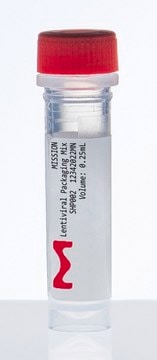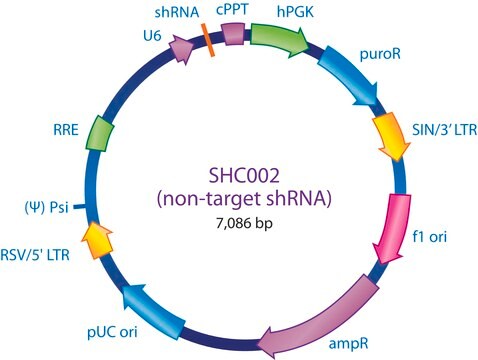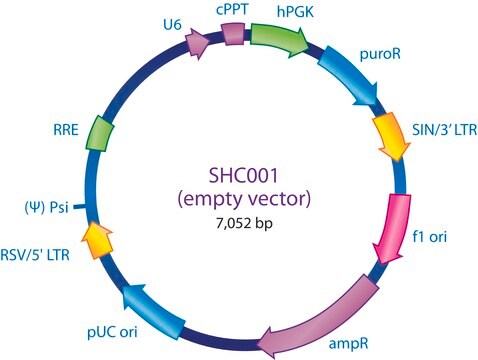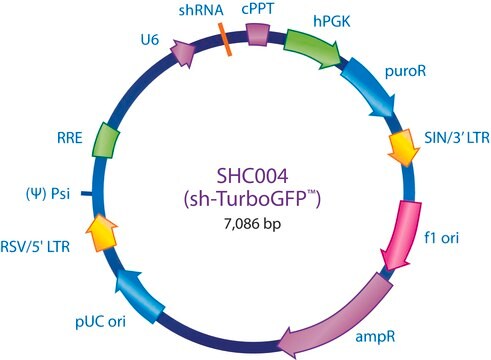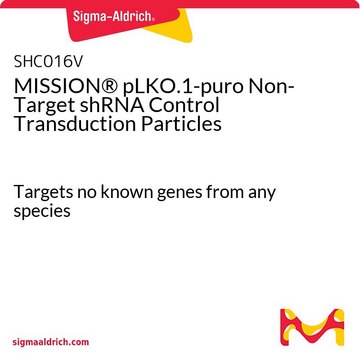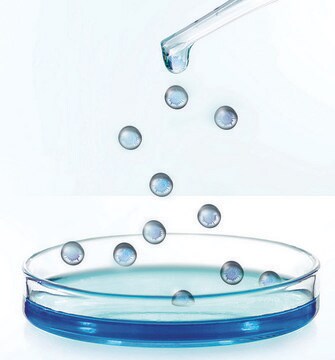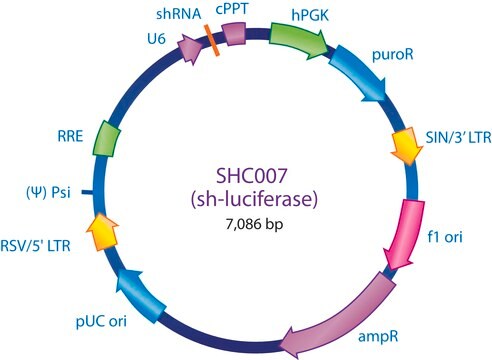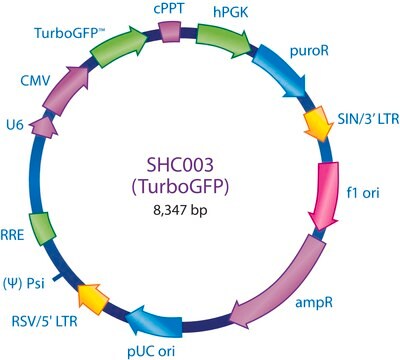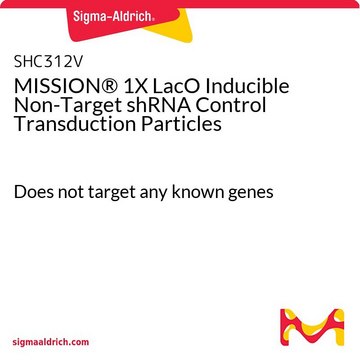Recommended Products
Quality Level
form
liquid
technique(s)
capture ELISA: 106 VP/mL using p24
shipped in
dry ice
storage temp.
−70°C
Looking for similar products? Visit Product Comparison Guide
General description
Our comprehensive shRNA product offering consists of over 150,000 pre-cloned shRNA constructs targeting more than 15,000 human and 15,000 mouse genes. The library is available in: gene family sets: gene collections related to specific functional classes such as kinases and ion channels; gene taget sets, sets of shRNA clones that target your favorite gene; and individual shRNA clones. Our shRNA and lentiviral manufacturing platforms utilize dedicated laboratories featuring state-of-the-art robotics, liquid handling and laboratory information management systems (LIMS) to provide superior quality and service for your RNAi research needs.
We provide innovative solutions for academic research, biotech research and pharmaceutical drug discovery. Our excellent systems, equipment, and personnel provide the highest quality tools that you require.
Custom Cloning - Now with TurboGFP™
There may be times when classic drug selection for stable or semi-stable cell lines is not possible or desired. In addition, orthogonal methods of selection from puromycin may be required for the expression of multiple shRNAs or expression of shRNA concomitant with transgene expression.
We now offer vectors containing tGFP as a solution to these problems. This vector maintains all of the other elements of the pLKO.1 vector, but the puromycin resistance gene has been replaced by TurboGFP. Our MISSION bio-production team will customize the vector with either a TRC shRNA sequence or your favorite shRNA sequence. With TurboGFP in the vector, FACS and fluorescence microscopy techniques allow for rapid estimation of transduction efficiency and automated, rapid selection of cell populations that stably express the shRNA. Selection by GFP provides an orthogonal method when cells already stably express puromycin resistance. In addition, we also offer pLKO.1-puro-CMV-tGFP. With this vector, you can choose between GFP and puromycin selection, all with the shRNA expression vector.
For selection by a second class of antibiotics, we offer vectors containing the neomycin resistance gene. These two vectors are pLKO.1-hPGK-Neo and pLKO.1-CMV-Neo. Stable shRNA integrants can be found by selecting in G418 (Product Number A1720). As with puromycin, a cytotoxicity profile for your particular cell line will need to be generated. As an example, see the puromycin protocol, but utilize G418 instead of puromycin. As a starting point, 1 mg/mL of G418 has been utilized for selection of shRNA constructs in A549 cells.
The service includes cloning, sequencing, DNA preparation (500 ng) and lentiviral preparation (200 μl at 1 x 106 VP/mL, minimum titer via p24 assay). The DNA and viral preparations are available to be shipped 4-6 weeks from the time the order is placed. For ordering, visit our custom shRNA ordering page or contact our sales representative.
Large-Scale and High Titer Lentiviral Particles
We have a versatile manufacturing platform for high-throughput or large-scale viral production of most HIV-1-based lentiviral vectors. The standard format of the MISSION TRC shRNA collection is 200 μl of 1 x 106 VP/mL (via p24 assay) minimum titer. Any clone, target set, or control can be produced at larger volumes with the same minimum titer specification or higher titers. Our highest titer option is 109 VP/mL. We also accommodate large-scale and high titer viral preparation using clones you send to us (must be compatible with our system). Our robust and optimized processes will save you time and reduce variability in your transduction experiments. To review pricing or to submit a request for a quotation on your specific project, please use our MISSION Custom Request Submission Form.
Custom Cloning - Now with TurboGFP™
There may be times when classic drug selection for stable or semi-stable cell lines is not possible or desired. In addition, orthogonal methods of selection from puromycin may be required for the expression of multiple shRNAs or expression of shRNA concomitant with transgene expression.
We now offer vectors containing tGFP as a solution to these problems. This vector maintains all of the other elements of the pLKO.1 vector, but the puromycin resistance gene has been replaced by TurboGFP. Our MISSION bio-production team will customize the vector with either a TRC shRNA sequence or your favorite shRNA sequence. With TurboGFP in the vector, FACS and fluorescence microscopy techniques allow for rapid estimation of transduction efficiency and automated, rapid selection of cell populations that stably express the shRNA. Selection by GFP provides an orthogonal method when cells already stably express puromycin resistance. In addition, we also offer pLKO.1-puro-CMV-tGFP. With this vector, you can choose between GFP and puromycin selection, all with the shRNA expression vector.
For selection by a second class of antibiotics, we offer vectors containing the neomycin resistance gene. These two vectors are pLKO.1-hPGK-Neo and pLKO.1-CMV-Neo. Stable shRNA integrants can be found by selecting in G418 (Product Number A1720). As with puromycin, a cytotoxicity profile for your particular cell line will need to be generated. As an example, see the puromycin protocol, but utilize G418 instead of puromycin. As a starting point, 1 mg/mL of G418 has been utilized for selection of shRNA constructs in A549 cells.
The service includes cloning, sequencing, DNA preparation (500 ng) and lentiviral preparation (200 μl at 1 x 106 VP/mL, minimum titer via p24 assay). The DNA and viral preparations are available to be shipped 4-6 weeks from the time the order is placed. For ordering, visit our custom shRNA ordering page or contact our sales representative.
Large-Scale and High Titer Lentiviral Particles
We have a versatile manufacturing platform for high-throughput or large-scale viral production of most HIV-1-based lentiviral vectors. The standard format of the MISSION TRC shRNA collection is 200 μl of 1 x 106 VP/mL (via p24 assay) minimum titer. Any clone, target set, or control can be produced at larger volumes with the same minimum titer specification or higher titers. Our highest titer option is 109 VP/mL. We also accommodate large-scale and high titer viral preparation using clones you send to us (must be compatible with our system). Our robust and optimized processes will save you time and reduce variability in your transduction experiments. To review pricing or to submit a request for a quotation on your specific project, please use our MISSION Custom Request Submission Form.
Other Notes
For ordering any of our custom shRNA services either visit custom shRNA services, or e-mail us at MISSIONRNAi@sial.com.
To see protocols and application data please visit sigma.com/shrna.
Legal Information
Use of this product is subject to one or more license agreements.
MISSION is a registered trademark of Merck KGaA, Darmstadt, Germany
TurboGFP is a trademark of Evrogen Co.
Storage Class Code
12 - Non Combustible Liquids
WGK
WGK 3
Flash Point(F)
Not applicable
Flash Point(C)
Not applicable
Certificates of Analysis (COA)
Search for Certificates of Analysis (COA) by entering the products Lot/Batch Number. Lot and Batch Numbers can be found on a product’s label following the words ‘Lot’ or ‘Batch’.
Already Own This Product?
Find documentation for the products that you have recently purchased in the Document Library.
Customers Also Viewed
Constantinos Kolliopoulos et al.
Matrix biology : journal of the International Society for Matrix Biology, 80, 29-45 (2018-09-09)
The glycosaminoglycan hyaluronan has a crucial role in tissue organization and cell signaling. Hyaluronan accumulates in conjunction with rapid tissue remodeling during embryogenesis, as well as in inflammatory conditions and cancer. We report a negative correlation between the expression of
Min Ling et al.
Cell & bioscience, 7, 27-27 (2017-05-27)
Bone degenerative disorders like osteoporosis may be initiated by age-related shifts in anabolic and catabolic responses that control bone homeostasis. Although there are studies suggesting that metabolic changes occur with stem cell differentiation, the molecular mechanisms governing energy metabolism and
Ermira Pazolli et al.
Cancer research, 69(3), 1230-1239 (2009-01-22)
Alterations in the tissue microenvironment collaborate with cell autonomous genetic changes to contribute to neoplastic progression. The importance of the microenvironment in neoplastic progression is underscored by studies showing that fibroblasts isolated from a tumor stimulate the growth of preneoplastic
Articles
MISSION® Lentiviral shRNA
Our team of scientists has experience in all areas of research including Life Science, Material Science, Chemical Synthesis, Chromatography, Analytical and many others.
Contact Technical Service




